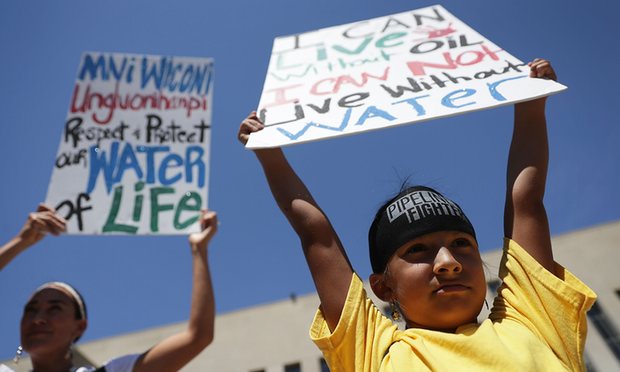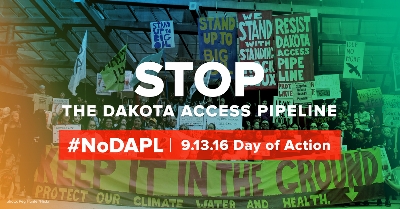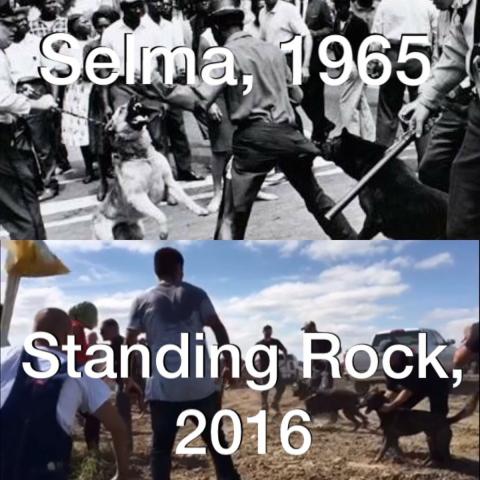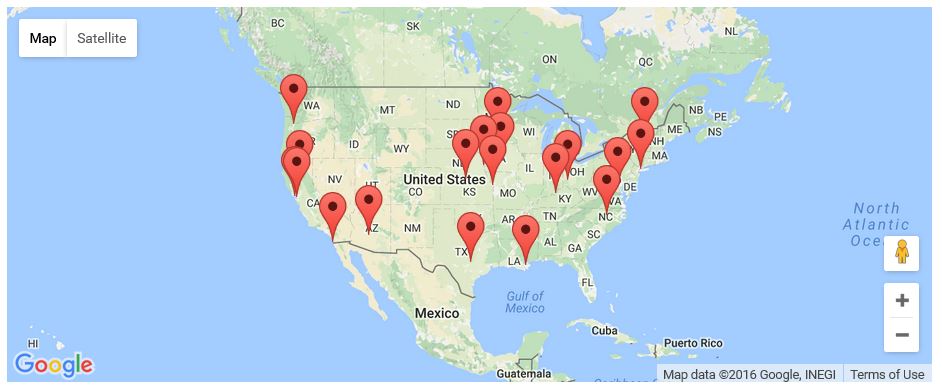Native Rights, Water, Dogs and Pipeline - Attack on Original Nations and Larger Threat to Earth's Water Supply; Sept. 13 Nationwide Solidarity Actions
- Standing Rock: The Biggest Story That No One's Covering - Jim Gray (Indian Country)
- Vicious Dogs and Coercion Unleashed on Original Free Nations - Steven Newcomb (Indian Country)
- #NoDAPL Day of Action - Tuesday Sep. 13
By Jim Gray
September 8, 2016

Omaka Nawicakinciji, 7, of the Oglala Lakota Nation in South Dakota, protested the Dakota Access pipeline with his mother, Heather Mendoza, in Washington, last week.
Credit Alex Wong/Getty Images // New York Times
I think there's a visceral reaction that prevents some people in the non-Indian community to find solidarity with today's Native American issues.
Whether it's gaming, Indian children in the foster care program, religious freedom, sacred sites, or quality of life issues where the public must take the time to understand our perspective, we often find ourselves in the losing battle for understanding and acceptance.
Not to say there haven't been significant victories in these areas in the modern era, it's often come in the Federal Courts in the 1970s when there was greater political activism to march, rally, and file suits in federal court to address these injustices. In those days the Judicial Branch of the U.S. government embraced the notion of tribal sovereignty, treaties, and had the courage to issue decisions in favor of tribal rights on a number of issues close to the hearts of Indian people. These decisions are still binding on today's activities in Indian country and U.S. law. Protection of sacred sites, religious liberty and a Trust responsibility of the U.S. to individual Indian people were chief among them.
These decisions were in concert with federal policies and statutes that were restating the Federal Trust relationship with tribes and Indian people. U.S. recognition of the vast poverty that existed in Indian country as well as the neglect of the rest of the country into thinking the Indian wars were over and tribes and Indian people were assimilated into the fabric of this country. This lack of understanding led to the activism in the streets and the prairies of this country which rekindled a spirit of correcting the wrongs of the past and restating a new vision of what it means to be Native in the 20th century.
At the close of the 80s, the 20 years from Alcatraz to the Indian Self Governance Act, ushered a time of federal acknowledgment of modernizing the way the world of Indian country works. From the Indian Self Determination and Education Assistance Act, Indian Gaming Regulatory Act, Native American Graves Protection and Repatriation Act, Indian Minerals Development Act, Indian Child Welfare Act, are just a sampling of the laws which empower tribes and Indian people to take greater control over their tribal governments to carrying out more federal programs that improved the capacity of tribal governments to be more effective and prioritize their limited resources to areas of greatest need.
Despite these achievements the rest of the country was still looking at Indian country as a remnant of the past and/or largely forgotten. Back east, they didn't think we still existed. Then when you add to what Hollywood, Madison Ave, public education and the news media failed to do by not only acknowledging our accomplishments or success but also by neglecting either deliberately or by accident that millions of Indian people still exist and hundreds of tribal governments still exist. Our identity existed as something from the past and anything occurring in present time was irrelevant.
As a result, our present condition was ignored.
Setting aside who is to blame for the lack of understanding of our issues, let's fast forward to today's action going on in North Dakota where the largest gathering of Native people in opposition to the construction of a massive pipeline project going on near the Standing Rock Indian Reservation. Officials there claim the project threatens the only water supply for the impoverished reservation which adversely affects the quality of life for Indian and non-Indian people in the area. To add insult to injury, the Tribal leadership's concerns have been ignored by Army Corps of Engineers who failed to properly consult with the Tribe prior to the approval of the pipeline project. Now we are learning that sacred sites have been identified in the path of this project and again no acknowledgment of what Indian country has to say about it.
In the last year, thousands of Native people have traveled to Standing Rock's reservation to join their brothers and sisters in what could be a long sustained presence to resist the construction of this pipeline project. In recent months, over 150 tribal governments across the U.S. have passed letters of support, resolutions and have sent tribal delegations with provisions to the reservation to assist the "Protectors". This kind of commitment is unprecedented in the modern era. Even during the height of the 70's, there never was this level of support both politically and in resources to help another tribe in their time of need.
Armed with an improved economic condition of many tribal nations around the country in law and policy, a new generation of Native people who have a grasp of the power of social media we now have a chance to flip the script that's been written in the past. But there is where the challenge lies. What was the point in all of these gains by Indian people and tribal governments in the past 50 years if the rest of the country isn't aware of our story? If it's news to the media, then it's time they started paying attention.
But it's also time we started telling our story.
The mainstream media and federal and state governments must take this revolution seriously, these activists in North Dakota are speaking in a language that is larger than the Indian community itself. If their message is carried over the national news cycle in the same way that the protests in Eastern Block countries at the end of the Soviet Union were covered, or the Middle East spring just a few years ago, it would be easier to see why the pendulum needs to swing back to protecting our water against the pursuit of corporate interests is a message that resonates with people all over the world.
What is America's response to the crisis in Standing Rock? I don't mean just the news media, or the government, I mean the people of America. Mainstream media needs to go to North Dakota, set up their mic in front of the people trying to protect their water and sacred sites and let them speak. You don't have to be an expert in Indian law or policy to understand what's going on, because their cause is universal to the human condition.
Jack booted private security personnel with attack dogs may be the enduring image to this effort, but if we want things to change in this country, we must resist the temptation to sink into an eye for eye mentality. That's why we need to broaden the message to a larger audience while we tell our story.
How long do you think you can survive without water? What would you do if your only source of water was threatened? So what if these questions are raised by a Native person? You don't have to be Native to understand it. You just have to be human.
[Jim Gray, (Osage) is the former Principal Chief of the Osage Nation, former Publisher of the Native American Times. He's been a consultant in Indian country working in government relations, government contracting, communications and government reform. Today, he is the Chief of Staff of the Sac and Fox Nation in Oklahoma. He resides in the Osage Nation in Oklahoma with his wife and family.]
By Steven Newcomb
September 7, 2016

Credit: The Other 98%
In my column, "The Dakota Access Pipeline and the Law of Christendom," I quoted Judge Catron of the Supreme Court of Tennessee, "Our claim is based on the right to coerce obedience" which, he asserted, is the "law of the land" used by the United States against our Original Nations.
On September 3, 2016, we saw an excellent illustration of a claimed right to coerce our nations into obedience: Private security personnel of Energy Transfer Partners using vicious dogs and pepper spray against Native people (women, children, and men), and non-Native opponents of the Dakota Access Pipeline (DAPL) near Cannonball, North Dakota.
The contrast between the Oceti Sakowin's prayerful path of the Sacred Pipe, which seeks to protect the precious waters of Mother Earth, her life blood, and the greed-driven path of the Crude Oil Pipeline speaks volumes. That contrast encapsulates the centuries-long conflict between the mindset of the Seven Laws of the Oceti Sakowin (and the spiritual laws of other Original Nations), and the Seven Laws of Domination found in the meaning of Christendom's Latin term "domo": "to subjugate," "to subdue," "to force into subservience," "to tame," "to domesticate," "to cultivate," and "to till."
The Dakota Access Pipeline project aptly symbolizes the toxic path of the American Empire being "increased and spread" across the territories of our nations, leaving behind a wake of destruction and poison: Think of the lead in the bloodstreams and brains of children in Detroit, of the mercury in the fish all over the continent, of the lead in the waters of Indiana poisoning people there, of the radiation in the groundwater at Hanford Nuclear facility, the 287 chemicals detected in the umbilical cord blood samples that the Red Cross gathered from pregnant women. 180 of the chemicals are known to cause cancer in humans or animals, 217 are toxic to the brain and nervous system, and 208 cause birth defects or abnormal development in animal tests. These and countless other kinds of examples are powerful indicators that the imperial trajectory of the almighty dollar does not revere and protect the beauty of the Fabric of Life.
All of this and more has been done to our nations, our ecosystems, and to everyone, in the name of "human" "civilization," mind you. Yet as Stanley Diamond accurately noted in his book In Search of the Primitive, "Civilization begins with conquest abroad and repression at home." The words conquest and repression are, of course, but two synonyms for domination.
The American empire's capitol was built with slave labor in Washington, D.C., and a property tax was levied on the slave owners for their slaves. The American empire along with its corporate interests has steadfastly claimed the right to coerce original free Native nations into obedience to a traumatizing system traced back to the empire of Christendom and the so-called Age of Discovery (Invasion).
Dogs of Christendom unleashed on defenseless Native people by Spanish conquistadors were used in keeping with two key phrases found in the papal decree unleashed by the Holy See on May 4, 1493. That document, and three others issued that year, exhorted the Spanish monarchs to "prosecute the propagation of the Christian empire," ("imperii Christiani propagationem prosequi"), and "subjugate the barbarous nations" ("barbarae nationes deprimantur").
Through their actions, the Americans have transformed those phrases into "prosecute the propagation of the American Empire" and "dominate the Native nations." Take, for example, the use of dogs and pepper spray to dehumanize and terrorize our Native people and their non-Native supporters who were angered by Energy Access Transfers personnel intentionally bulldozing a destructive 150 foot swath for a mile and a half, directly through sacred and culturally significant locations. The dogs and pepper spray illustrate the behavior of a pitiless imperial system that could care less about "heathen-infidel" sacred places and burial sites.
The Dakota Access Pipeline is a major project of engineering. In their book Bridges, Canals & Tunnels: The Engineering Conquest of America (1968, American Heritage Publishing in Association with the Smithsonian Institution), David Jacobs and Anthony E. Neville introduce their subject matter by acknowledging the religious motivations behind the so-called "expansion" of the United States by colonizing the territories of our Native nations. "Like medieval crusaders, they [the American people] believed their mission to be divinely inspired, their victories inevitable" (p. 6).
Jacobs and Neville quote the poet Walt Whitman as stating: "It is for the benefit of mankind" that the United States' "power and territory should be extended-the farther the better" (Ibid.). This frames our nations and peoples as being outside the scope of "mankind." Jacobs and Neville say that "America's claims to the land were justified" by John L. O'Sullivan, when he was a thirty-two year old New York newspaper editor. It was O'Sullivan who said at that time (1845), "our manifest destiny is to overspread and possess the whole of the continent which Providence has given us."Chief Justice William Drayton of the state of South Carolina expressed this same sentiment seventy years before O'Sullivan in a grand jury address in 1776. Drayton spoke of the "unerring wisdom of Providence," who had chosen the present generation to establish the American empire-the one which promises to be the most glorious in history. The tradition of using vicious dogs and other techniques to coerce Native nations and peoples into obedience to its arbitrary control is also part of that "glorious" history of American empire-building.
Franklin (Indians + Rum = Land), Washington ("Town Destroyer"), Jefferson, Madison, Marshall, and many others all envisioned the American empire overrunning the entirety of the continent and our free nations. This overall tradition is encapsulated in wording from the papal decrees of 1452, 1455, and 1456, "invade, capture, vanquish, and subdue" all non-Christians, "reduce them," and "take away all their possessions and property," wording renewed in 1493 and 1514. This language was issued under "Apostolic authority," and therefore viewed as sanctioned by "God."
"In God We Trust," says the American dollar. The papal bull says of that God: "We trust in Him from whom empires (imperia), and dominations (dominationes), and all good things proceed" (papal bulls of May 3 and 4, 1493). Such is the mindset that the Dakota Hunkpapa Nation and the Oceti Sakowin are having to deal with in this latest saga with the invasive and colonizing Dakota Access Pipeline.
My thanks to William "Pila" Laronal (Kanaka Maoli) for his assistance with this column.
[Steven Newcomb (Shawnee, Lenape) is co-founder and co-director of the Indigenous Law Institute, and author of Pagans in the Promised Land: Decoding the Doctrine of Christian Discovery (Fulcrum, 2008). He is a producer of the documentary movie, The Doctrine of Discovery: Unmasking the Domination Code, directed and produced by Sheldon Wolfchild (Dakota), with narration by Buffy Sainte-Marie (Cree). The movie can be ordered from 38Plus2Productions.com]

Be part of a national day of action against the Dakota Access Pipeline on Tuesday, September 13! Find an event near you, or sign up to host an action in solidarity with the indigenous communities and local farmers and landowners fighting on the front lines.
New solidarity actions and cities being added daily. Click here.
Right now, we're witnessing one of the most courageous stands against a fossil fuel project this country has ever seen. The movement to stop the Dakota Access Pipeline is growing stronger by the day, and it's time for all of us to rise up and play a role in this fight - no matter where we live.
If built, Dakota Access would carry toxic fracked oil from North Dakota across four states and under the Missouri River, immediately upstream from the Standing Rock Sioux Nation. That makes it a threat to the sacred land and water of Native communities and a disaster for the climate.
Thousands of Indigenous activists have set up prayer camps along the pipeline route in a historic moment of nonviolent resistance. They're fighting with everything they have to protect their water, the land, their history, and the climate -- and we need to fight with them.
To defeat a pipeline, it takes a movement of people from all corners of the nation. That's why on Tuesday, September 13, people around the country are taking part in a day of action in solidarity with Standing Rock calling on President Obama to instruct the Army Corps of Engineers to revoke the permits for this dirty oil pipeline.
Here are more ways to support activists on the front lines:
- Actions targeting financial institutions funding the pipeline are happening around the country between now and September 17. Learn more here and find an event near you here.
- Contribute to the Sacred Stone Camp legal defense fund
- Contribute to the Sacred Stone Camp supply fund
- Call the White House at (202) 456-1111 telling President Obama to rescind the Army Corps of Engineers' Permit for the Dakota Access Pipeline
Spread the word on social media using #NoDAPL
Supporting Organizations:
Honor the Earth
Indigenous Environmental Network
350.org
CREDO Action
Sierra Club
Bold Alliance
Greenpeace
U.S. Climate Plan
Environmental Action
Just Foreign Policy
Climate Hawks Vote
Stand.Earth
WildEarth Guardians
350 Louisiana
Women's Earth and Climate Action Network (WECAN)
Earth Action, Inc.



Spread the word